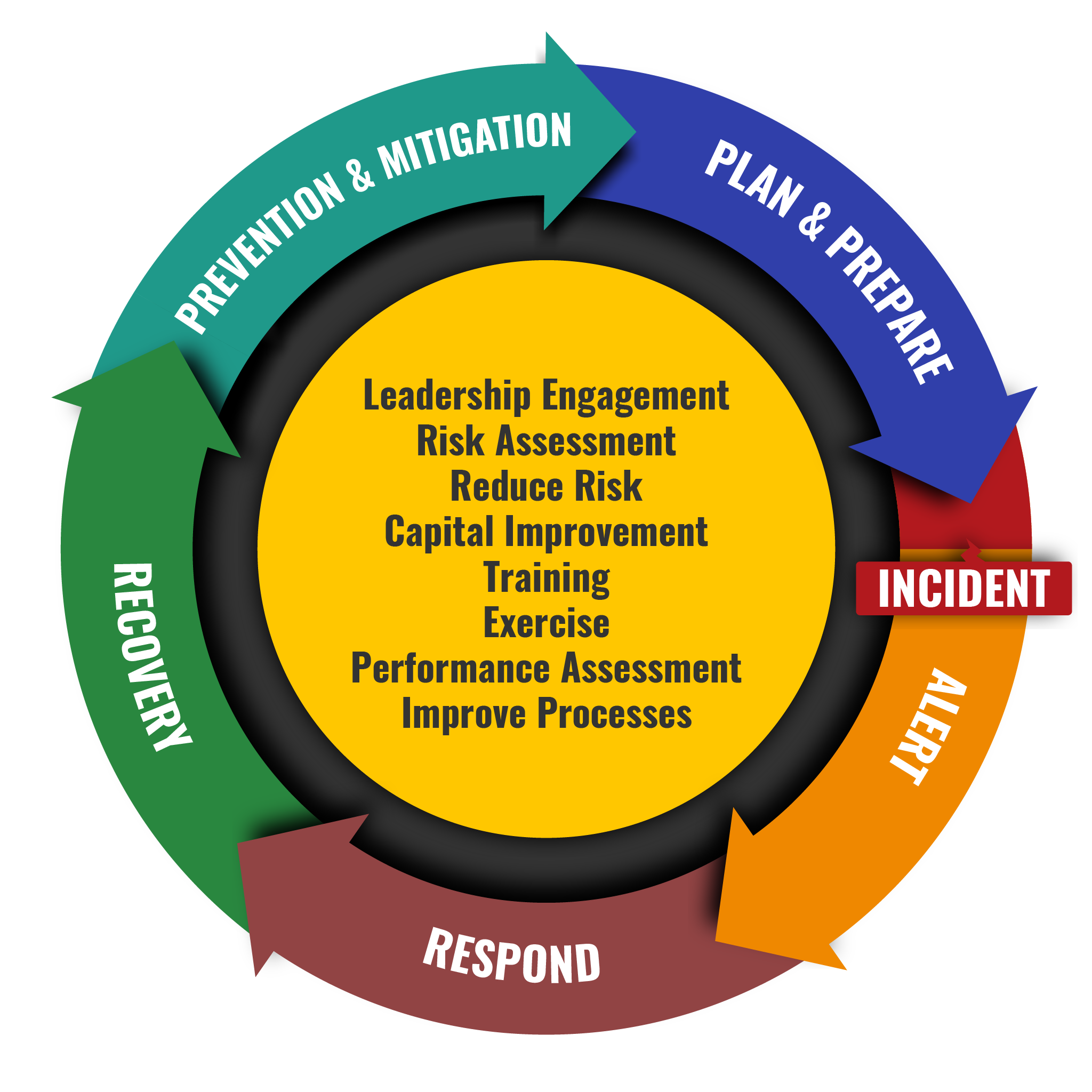Missouri Western – Basic Emergency Operation Plan

Plan & Prepare is the process of planning and preparing for how to respond when an emergency occurs, and coordinating physical and human resources to respond effectively. Planning and Preparing includes establishing authorities, procedures and plans, training, exercises, and acquiring and maintaining resources.
Incident refers to the actual emergency event which occurs. See Levels of Emergency.
Alert is the process of communicating information about the emergency to the campus community.
Respond is quick action to save lives, protect property and environment, and contain and stabilize the incident. Response also includes search and rescue, emergency medical care, firefighting, and security.
Recovery could be short-term or long-term efforts. Short-term recovery efforts will focus on restoring vital services to the university and providing the basic needs of staff and students, such as temporary food and shelter, restoring critical services and functions. Long-term recovery efforts focus on restoring the university to normal operations.
Prevention & Mitigation activities are geared towards reducing or eliminating hazards related to an emergency. It is an integral part of the emergency management program which should assist in strengthening facilities and reducing damage.
| AAR | After Action Report |
| ADA | Americans with Disabilities Act |
| ALS | Advanced Life Support |
| ASTREC | Animal Science Teaching & Research Center |
| CEOC | Community Emergency Operations Center |
| CFR | Code of Federal Regulations |
| CIKR | Critical Infrastructure and Key Resources |
| CPG | Comprehensive Preparedness Guide |
| EAS | Emergency Alert System |
| ED | U.S. Department of Education |
| EMC | Emergency Management Coordinator |
| EMD | Emergency Medical Dispatch |
| EMS | Emergency Medical Services |
| EOP | Emergency Operations Plan |
| ERM | Enterprise Risk Management |
| FBI | Federal Bureau of Investigation |
| FD | Fire Department |
| FEMA | Federal Emergency Management Agency |
| FMO | Financial Management Agency |
| GEPA | General Education Provisions Act |
| GERG | Geo Chemical & Environmental Research Group |
| HEOA | Higher Education Opportunity Act |
| HSC | Health Science Center |
| HSEEP | Homeland Security Exercise and Evaluation Program |
| HSPD | Homeland Security Presidential Directive |
| ICP | Incident Command Pose |
| ICS | Incident Command System |
| MOA | Memorandum of Agreement |
| MOU | Memorandum of Understanding |
| NCAA | National Collegiate Athletic Association |
| NIMS | National Incident Management System |
| PD | Police Department |
| PIO | Public Information Officer |
| RCRA | Resource Conservation and Recovery Act |
| RSS | Really Simple Syndication |
| SASE | Office of Safety & Security |
| SMS | Short Message Service |
| TDD | Telecommunications Devices for the Deaf |
| UPD | University Police Department |
| USC | United States Code |
The mission of the Missouri Western State University Police Department is:
- To provide a reasonably safe campus environment.
- To protect personnel and property.
- To detect and report fire and safety hazards.
- To regulate and enforce campus parking and traffic.
- To provide education and training on security and safety matters for the college community.
- To conduct investigations.
- To coordinate with city, state, and federal law enforcement officials.
- To coordinate an emergency system to local hospitals.
- To implement snow and other contingency alert plans when conditions warrant.
MWSU Police Department is organized and staffed in accordance with guidelines of the Campus Association of Law Enforcement Administrators to provide essential service and to respond to critical situations anywhere on campus within a reasonable amount of time. MWSU Police Department personnel have legal and police jurisdiction over public streets, public property, or private property. In emergencies, the St. Joseph Police Department are called first as back-up support. Appropriate University officials are called as soon as possible.
The MWSU Police Department employs five full-time Police Officers, two part-time Police Officers, and one Assistant Police Chief. The Department also uses student interns to assist during the regular semesters.
There are four police vehicles for mobility and response, and a 24-hour telephone communication system.
At Missouri Western, the MWSU Police Department provides service to the general campus and outlying campus areas.
Behavior, conduct, discipline and security within the residence halls are the responsibility of the Student Affairs Office and the Dean for Student Development.
Each resident assistant has access to a telephone used to contact the MWSU Police Department for safety reasons.
There are regular motor patrols of the residence halls, parking lots, academic buildings and open areas. These also include foot patrols and walk-throughs by the MWSU Police Department officers.
The safety and security of the campus are jeopardized when students use excessive alcohol, show lack of self-discipline, display a lack of concern for others, prop open doors, sneak guests in, violate visitation rules and give out keys.
The concept of team security is effective when all members of the University act responsibly and sensibly.
All accidents, injuries, illnesses, or deaths on campus or in the University facilities should be promptly reported to the MWSU Police Department. Because of the close proximity of hospitals, intensive care units, city ambulances, and for a variety of other legal reasons, it is University policy and procedure to rely on the MWSU Police Department for all emergency medical first aid treatment.
Accurate information must be provided to the emergency medical personnel responding to the call. The exact location, directions to the accident scene, and a description of the specific illness needs to be reported.
Personal property is your responsibility and it needs to be protected from theft. Identify and engrave all items of value with your G# and/or the last 4 digits of your Social Security number. Require identification and authorization from any service personnel before letting them into your room or office. Do not allow them to remove any item for service without proper clearance. Each employee carries a photo identification card.
Keep as few valuables as possible in your residence hall room or office. Check your family’s insurance policy to see if your valuables are protected while you are at Missouri Western. The University insurance does not cover your personal property.
Record all information about your personal property and keep the list in a safe place. Send an extra copy home or hide it in a separate place. The MWSU Police Department keeps copies of all valuables that have serial numbers engraved through the Operation I.D. program.
Do not use weapons which can be turned against you. Instead, improvise and use car or room keys, umbrellas, nail files, etc., to aid in your escape. Keep physically fit. If you are confronted with a threatening situation, don’t try to use karate or weapons. Try to run away from the attacker. Use your natural instincts to run, yell, kick, punch, or bite. Most importantly, try to escape.
Do not be a hero when confronted by a dangerous situation or person. Think fast, fumble for money, or run toward an open office or room. If necessary, give up the purse, wallet, or money rather than risk your life or injury. Remain alerted to the situation and to details so you can provide specific information to the authorities.
Self-protection is the use of common sense actions that police and security agencies know to be ordinarily effective. It means knowing how to avoid being a victim, keeping alert to your environment, being safety conscious and alert to dangerous situations and suspicious persons, learning how to protect yourself and your property, and most importantly knowing what to do if you become a victim.
All students, faculty and staff are urged to use good judgment and common sense in the places they go, how they get there and the times they visit those places.
The Campus Community must be alert to problems and report them to the MWSU Police Department immediately. Do not wait to report an incident, otherwise, there is little the MWSU Police Department or other local law enforcement can do to help.
Keep your doors locked at all times, even when someone is at home. Find out who is knocking before opening the door. Never leave room or residence doors propped open for a friend, delivery person, or for any other reason. Do not admit strangers into your room. Ask for identification. If you have any questions, call MWSU Police immediately.
Never lend keys to your vehicle or room. If your residence keys are lost/stolen, report this to the Residential Life Office and MWSU Police Department. Don’t leave keys laying in open, unprotected areas.
Leave light(s) on when you go out at night and have your keys ready for quick entry upon your return. If you are suspicious for any reason, call the proper authorities before attempting re-entry.
Secure the window when you leave your room or residence. When you return, look for broken or open windows. Pull the shades or close your drapes after dark. Be alert for strange sounds or smells around your residence, in the hallways, under stairs, and in darkened areas.
When you receive a nuisance, obscene, or prank telephone call, hang up immediately. Do not engage in conversation. Report the calls promptly.
Do not leave notes pinned to your door concerning your destination, how long you will be away, when you will return or where the hidden key is located.
Lock your office whenever you leave, even if you will be gone only a few minutes. Keep your purse, wallet, and other valuables in a secure container such as a locked desk or filing cabinet.
Keep all outside doors locked.
If you are entrusted with a key to a specific area, never loan it to anyone.
Always walk with several people at night. Do not walk alone. Know where you are going before you leave and plan your route before walking or driving. Walk on well-lighted and well-traveled paths, sidewalks, or streets. Avoid shortcuts through parks, alleys, unknown or dark areas, or apparent problem areas.
Report any suspicious person(s) loitering in the nearby area to the MWSU Police Department. Report all crimes, no matter how minor, to the MWSU Police. If you receive an annoying or obscene phone call, write down the time, what the caller said and any background noises you may have heard. Report the incident to MWSU Police immediately.
Avoid walking alone at night, and walk with other employees to and from your car.
Be alert and cautious as you pass large buildings.
Never leave one of your group alone at an isolated place. If you find yourself stranded, call a friend, a taxi, or the MWSU Police Department.
Don’t accept rides from strangers and never hitchhike.
Dress appropriately for safety. Keep your purse tucked securely under your arm and don’t overload yourself with bundles.
Wait for buses or taxis in a protected area, inside a house, store, etc. Ask taxi drivers to wait until you have entered your residence. Ride near the front with the driver on empty buses.
While at stop lights or intersections, keep your vehicle in gear with doors locked and windows up.
Never leave valuable items on seats or exposed in your vehicle. Cover them or place them in your locked trunk.
Park in areas that will be well-lighted when you return. Lock the doors, close the windows and secure all valuables to discourage theft.
When you return, be sure no one is hiding in, or under the vehicle.
In the case of car trouble, raise the hood and tie a white cloth to the antenna. Stay inside your car with the doors locked. Ask anyone who stops to report the trouble to the nearest service station. Do the same for others with car trouble.
If you think you are being followed as you walk, cross to the opposite side of the street. If it continues, go immediately to the nearest phone and call the police.
If you are walking or driving and a vehicle follows you, turn around and go in the opposite direction. If the vehicle persists, try to record the vehicle license number and other details. Get to a phone, and call the police as soon as possible to report the incident.
If you are driving, don’t drive home or get out of the car; drive to the nearest police station, open store, or service stations for assistance.
Do not allow someone to force you to the curb while driving. Keep driving, note the license number and car description, and report the occurrence immediately.
International Association of Campus Law Enforcement Administrators
It is the mission of IACLEA to support institutions of higher education in achieving their goals of providing a safe and secure campus environment through the development of public safety career professionals, research and education of the campus community members.
Center for Disease Control and Prevention
Going to college is an exciting time in life. It’s a time for gaining new knowledge and experiences, both inside and outside the classroom. Here are a few tips for college students on staying safe and healthy.








